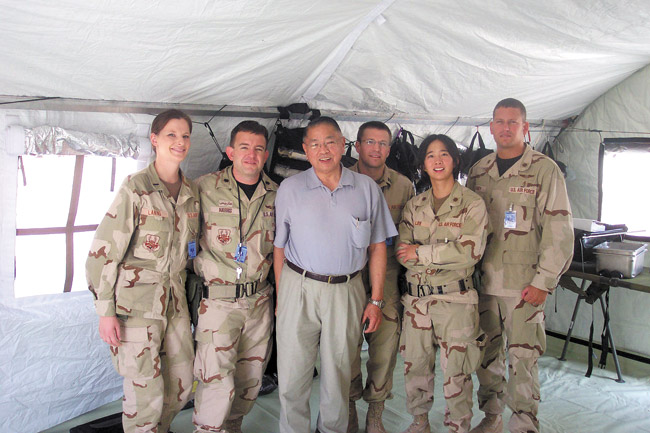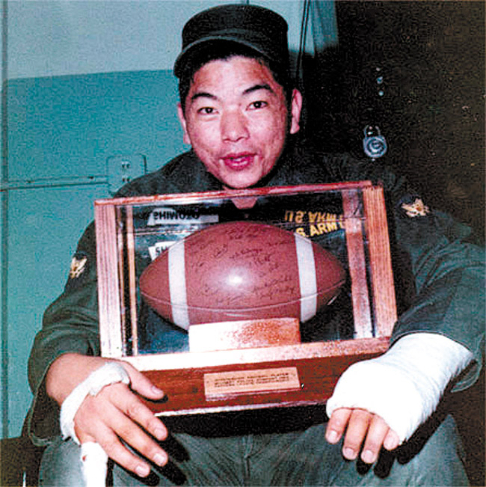Mr. Counter-terrorism
IOLANI AND UH ALUM WADE ISHIMOTO IS A LEADING INTERNATIONAL EXPERT ON FIGHTING TERROR
At 72 and slight of build, Wade Ishimoto doesn’t immediately bring to mind the image of an agent in the fight against international terrorism. But since leaving the University of Hawaii in 1968, the Delta Force charter member has become one of the world’s leading authorities on the subject, advising presidents, military leaders and Olympic organizers on how best to deal with the deadly threat.
mw-nm-061114-ishinoto-3
Ishimoto’s career track wasn’t planned. An admitted rambunctious lad, the former 145-pound center and linebacker for the Iolani Red Raiders bounced around between education and employment options until fate, bad luck or immaturity forced his hand.
After getting kicked out of Stevenson Intermediate School, Ishimoto attended Iolani because he liked the school’s baseball coach. Upon graduation, he attended Lewis and Clark College in Portland. At the time he had little interest in education, but the constant parental pressure eventually had its intended affect and he succumbed, “somewhat regrettably.”
Putting in 60-80 hours a week between work and school took its toll on the young Ishimoto, who decided to transfer to Cal State-Los Angeles after a professor advised him to do so. He never made it.
“I wasn’t too smart and lost all my money at Hollywood Park so I joined the Army,” recalls Ishimoto with a laugh. “I lost all of my summer savings by the fourth race.” He later enrolled at UH while serving in the Army.
That misfortune turned into a blessing. Ishimoto thrived in the Army, serving three tours in Vietnam as an operations sergeant with the Fifth Special Forces group. This is where his intelligence career began. Special forces members are expected to be both operational and intelligence specialists, but he never figured the assignment would be anything more than a temporary gig.
“I just went to where the flow was and where I thought it would be a cool thing.”
Success is often a matter of timing.
Ishimoto came of age professionally as the world was changing. Social, economic, religious and political changes were leading to a new kind of warfare, one that didn’t involve large standing armies. In 1972, the Munich Olympics were rocked when 11 members of the Israeli Olympic team were taken prisoner and killed by the Palestinian terror group Black September.
Five years later, when Ishimoto became a Delta Force member, the U.S. was in no position to combat the growing threat. On March 9, 1977, in what became known as the Hanafi Siege, 12 men who had broken away from the Nation of Islam took over three buildings in Washington D.C., grabbing 149 people as hostages. (Hanafi is one of the four “schools of law” in the Sunni Muslim tradition.) During the standoff, two men were killed.
“It woke up a lot of people. We didn’t have a dedicated counterterrorism ability in either the military or law enforcement agencies,” Ishimoto said.
In the wake of the siege, Army Chief of Staff Gen. Bernard Rogers began the process of creating special operations forces capable of responding to terrorist situations. In 1980, according to Ishimoto, U.S. Special Forces numbered about 8,000. Today, the force stands closer to 68,000.
“We got more people, better equipment and, in many cases, better diplomatic relations,” said Ishimoto. “There have been tremendous changes.”
Those years were difficult for Ishimoto and others in the still-young anti-terrorism industry. On Nov. 4, 1979, Islamic revolutionaries stormed the U.S. embassy in Tehran, taking more than 60 American hostages. The failed rescue attempt, which resulted in the deaths of eight U.S. soldiers, showed how ill equipped the military was to handle such a mission. Ishimoto was there, in charge of the road-block team. The failure came as no surprise to the veteran intelligence officer.
“Honestly, I just sort of shrugged it off. I didn’t think our chances for success were very good any way. It was a highly complex plan and there were parts of the plan that, in my mind, were not going to go very well.”
After 21 years in the Army, Ishimoto retired and began his current career as a civilian expert on all things terrorism related.
Among his many assignments, he has been a contributor to Fox News, ABC, CBS, and CNN, has assisted the Department of Defense in establishing a new Assistant Secretary’s Office for Homeland Defense, took a leadership role with the Nuclear Emergency Search Team, and led a White House-directed examination of security preparations for the 1984 Los Angeles Olympics. Mostly, Ishimoto has been a Distinguished Senior Fellow at the Joint Special Operations University. It’s the job he enjoys most.
In this position, the “semi retired” Ishimoto travels the world, sharing his knowledge with military and civilian leaders. His instruction offers more than classes in bad-guy identification — he wants to inspire his students to get involved and to speak up. Since October, Ishimoto has traveled to Germany, Lithuania, Estonia and Albania as part of that process.
“What I am trying to do and what I have been trying to do for the past 10 years is to inspire others to get up and be more bold in expressing their thoughts.”
The biggest question, are we safer today then we were on Sept. 11, 2001, is the most difficult for Ishimoto to answer. There are just too many variables.
Domestic terrorism, as witnessed in the 1960s and ’70s, has been reduced. Diplomatic successes, along with military and intelligence advances, have made it easier to spot trouble and respond quicker when events do happen. Also, state-sponsored terrorism has declined — this is both a blessing and a curse. Funding from nations like the former Soviet Union has dried up, but that has led to the fragmentation of terrorist organizations.
“When you have a dispersed group and a decentralized organization, it becomes much harder to take them out. That is the problem we are having with, in particular, with what is called the al Qaeda associate network today.”
Ishimoto and wife Bobbi have lived in Alexandria, Va., since 1996. His regular visits to Hawaii became infrequent in recent years as he battled cancer. He is now cancer free, feeling great. He no longer teaches martial arts — he is a 6th dan (black belt) in Aikido and has taught Goju Ryu Karate — but has no plans to discontinue the twice-month classes he teaches.
Ishimoto says his proudest accomplishment is witnessing the growth of the young people he has mentored. That’s a job from which he will likely never retire.







